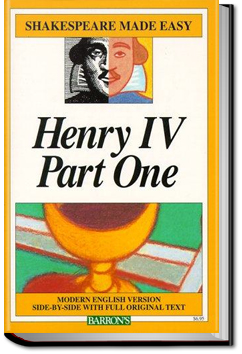

HOT.
Why, it cannot choose but be a noble plot:—
And then the power of Scotland and of York
To join with Mortimer, ha?
WOR.
And so they shall.
In faith, it is exceedingly well aim'd.
WOR.
And 'tis no little reason bids us speed,
To save our heads by raising of a head;
For, bear ourselves as even as we can,
The King will always think him in our debt,
And think we think ourselves unsatisfied,
Till he hath found a time to pay us home:
And see already how he doth begin
To make us strangers to his looks of love.
HOT.
He does, he does: we'll be revenged on him.
WOR.
Cousin, farewell: no further go in this
Than I by letters shall direct your course.
When time is ripe,— which will be suddenly,—
I'll steal to Glendower and Lord Mortimer;
Where you and Douglas, and our powers at once,
As I will fashion it, shall happily meet,
To bear our fortunes in our own strong arms,
Which now we hold at much uncertainty.
NORTH.
Farewell, good brother: we shall thrive, I trust.
HOT.
Uncle, adieu: O, let the hours be short,
Till fields and blows and groans applaud our sport!
[Exeunt.]
[Enter a Carrier with a lantern in his hand.]
1. CAR.
Heigh-ho! an't be not four by the day, I'll be hang'd:
Charles' wain is over the new chimney, and yet our horse' not
pack'd.—What, ostler!
OST. [within.] Anon, anon.
1. CAR. I pr'ythee, Tom, beat Cut's saddle, put a few flocks i
Get ALL YOU CAN BOOKS absolutely FREE for 30 days. Download our FREE app and enjoy unlimited downloads of our entire library with no restrictions.
Have immediate access and unlimited downloads to over 200,000 books, courses, podcasts, and more with no restrictions.
Everything you download during your trial is yours to keep and enjoy for free, even if you cancel during the trial. Cancel Anytime. No risk. No obligations.
For just $24.99 per month, you can continue to have unlimited access to our entire library. To put that into perspective, most other services charge the same amount for just one book!

As avid readers, we understand the joy of immersing ourselves in a captivating story or getting lost in the pages of a good book. That's why we founded All You Can Books back in 2010, to create a platform where people can access an extensive library of quality content and discover new favorites.
Since our founding days, we’ve continuously added to our vast library and currently have over 200,000 titles, including ebooks, audiobooks, language learning courses, podcasts, bestseller summaries, travel books, and more! Our goal at All You Can Books is to ensure we have something for everyone.
Join our community of book lovers and explore the world of literature and beyond!